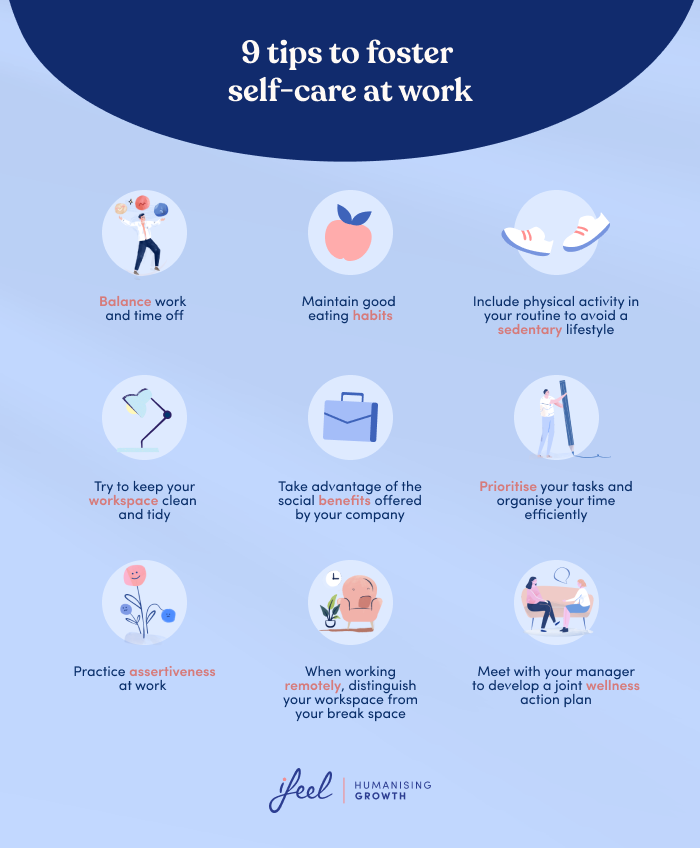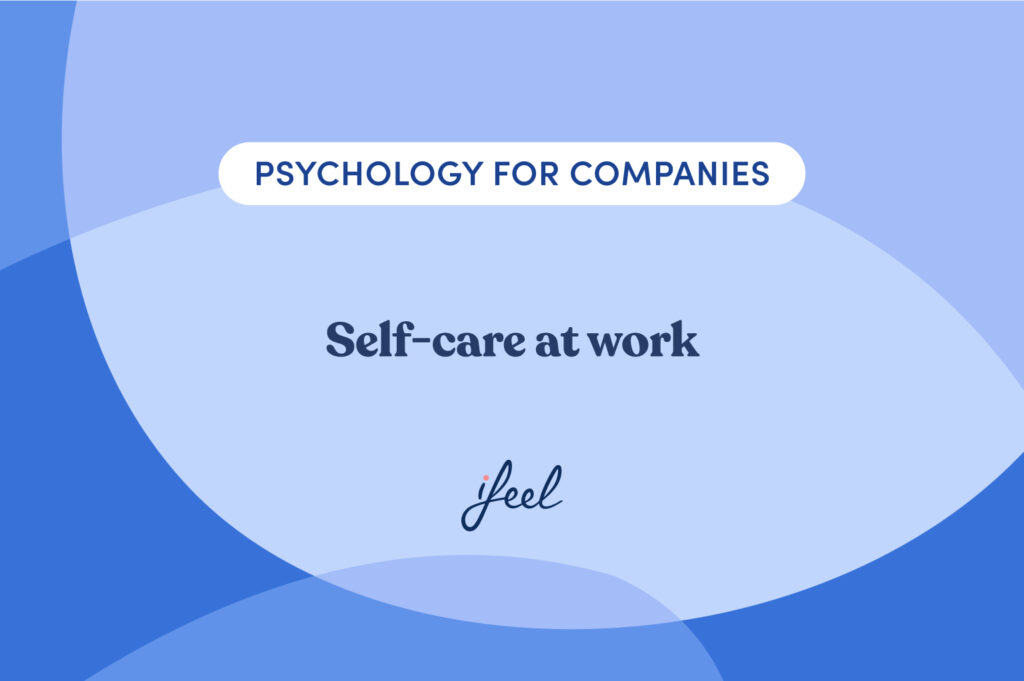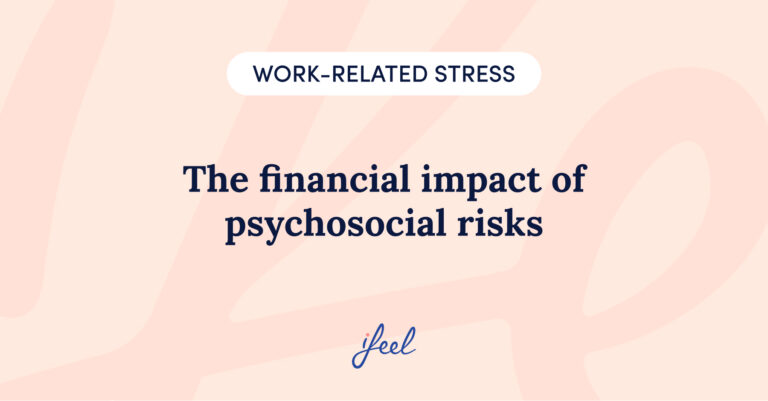Self-care at work requires a self-critical and ambitiously realistic approach to what aspects – of life in general and the way of working in particular – employees need to change, eliminate, or enhance to increase self-care in the company.
It is about employees taking responsibility, outside and inside the office, for their well-being. To do so, they inevitably need the cooperation of the organisation they work for.

Why is practicing self-care important?
What are some simple self-care practices I can incorporate into my work routine?
Implementing small self-care rituals like taking short breaks, staying hydrated, practicing mindful breathing, or setting boundaries can make a significant difference in managing stress and enhancing overall well-being at work.
What are the signs that indicate I need to prioritise self-care at work?
Signs of burnout, such as feeling constantly exhausted, irritable, or experiencing decreased productivity, are clear indicators that it’s time to prioritise self-care. Additionally, feelings of overwhelm, anxiety, or difficulty concentrating can signal the need for self-care interventions.
As an HR manager, how can I create a supportive self-care environment in the workplace?
Encouraging open communication about mental health, promoting flexible work arrangements, and fostering a culture that values work-life balance are crucial steps in creating a supportive environment for self-care at work. Additionally, leading by example and advocating for self-care practices can inspire others to prioritise their well-being as well.
9 elements of self-care at work
There are as many ways to boost our health outside and inside the workplace as there are employees, jobs, companies, and lifestyles to consider. However, and always remembering that the development of our well-being at work should be a continuous process, here are 9 aspects related to self-care at work.

1. The use of time outside and inside work
We all need to balance the different tasks and activities to which we dedicate our time. We must fulfill our responsibilities but also leave space for activities that positively impact rest, enjoyment, and connection with those aspects of life that matter most to us.
2. Eating healthy
The demands of our work organisation cannot be an excuse to neglect our diet. Just as we should do in our lives outside the professional sphere, we should also encourage healthy eating habits at work, taking care of both what we eat and how we eat. Eating healthy food in a calm environment and sharing quality time with colleagues is part of our self-care in the company.
3. Physical activity
Promoting good health is essential to prevent sedentary lifestyles and bad posture. If our work involves a lot of physical activity, resting when we leave the office is important. If not, it is important to compensate with good physical activity appropriate to our tastes and abilities when we leave the office.
4. Workspace
Our particular workspace should be as tidy and clean as possible. We should try to make it a comfortable space, facilitating the effective performance of tasks and a sense of emotional tranquility that makes the environment as friendly and disruptive as possible.
5. Use of corporate social benefits
Companies, especially large ones, have an increasingly well-developed benefits strategy aimed at improving the lives of their employees and fostering their physical and psychological well-being. Regardless of the areas in which these benefits packages can improve, making the most of them can be a good measure of self-care at work.
6. Organisation at work
Self-care at work involves, among other things, proper work organisation, efficiently prioritising each day’s tasks, taking appropriate breaks, and scheduling the work to be done before and after the vacations so they can be thoroughly enjoyed.
7. Assertiveness
An indisputable form of self-care at work is the ability to set limits for others without harming their relationship, pointing out our spaces in a constructive way to coworkers, and promoting the quality of interpersonal relationships.
8. Self-care in remote work
When we talk about self-care at work, we are referring to improving our health in the office and whenever we are working. Therefore, those who work remotely must also observe specific guidelines to be better and prevent health risks. Some countries, such as Mexico, are already legislating in this regard, as shown in NOM 037.
9. Wellness action plan
Take advantage of a meeting with your supervisor so that you can jointly draw up a Wellness Action Plan. At ifeel, we have designed a Wellness Action Plan template which you can use to fill out with your manager, this confidential document is used to fill out what triggers employees’ mental well-being as well as how to keep it optimal. Even if you design it together, you are in the driver’s seat: it is a plan for the employee drawn up by the employee.

Benefits of boosting self-care at work
There are a number of benefits to boosting self-care at work. Not only does it benefit the employees’ mental well-being and performance but it also leads to overall organisational success and reputation.
| Benefits of Self-Care at Work | Description |
| Reduced stress | Engaging in self-care practices like mindfulness, breaks, and boundary-setting can lower stress levels. |
| Improved focus | Regular self-care boosts concentration and cognitive function, leading to increased productivity. |
| Enhanced well-being | Prioritising self-care fosters emotional balance and overall mental well-being in the workplace. |
| Prevention of burnout | Self-care helps prevent burnout by promoting relaxation, and work-life balance. |
| Better work-life balance | Incorporating self-care practices allows for a healthier balance between professional and personal life, allowing the employee to spend time doing what they enjoy. |
Mental well-being for organisations
Ifeel has designed a mental well-being solution for companies, designed by its team of expert psychologists to help companies place the care of their employees’ psychological health at the heart of their corporate culture.
Thanks to this collaboration, organisations can count on the necessary tools to promote self-care at work in the most efficient way possible.
With this service, HR managers can receive personalised, data-driven advice on improving the psychological well-being of the teams in their charge. If you are part of the HR department in your organisation, we recommend that you try our program now and see how it could help you.
This program offers all employees a complete mental health care service that they can access in different ways depending on their needs. Those who wish to have access to an online therapy service with one of our psychologists specialised in cases like theirs or interact with one of our professionals to receive emotional support in a more specific circumstance that worries them.
Of course, in our Resources section, you can find different materials that will help you with many of your day-to-day functions as part of the HR department. For example, podcasts, HR guides on various topics (e.g., employee experience or how to design a good HR strategy), or interviews with leading HR executives. In addition, we have a Psychosocial Risk Factors Template, which you can use to comply with the requirements of the Labor Inspectorate.
We hope you found this post on self-care at work useful and interesting. If you would like more information about our mental well-being solution for companies, simply request it, and we will contact your team as soon as possible.







